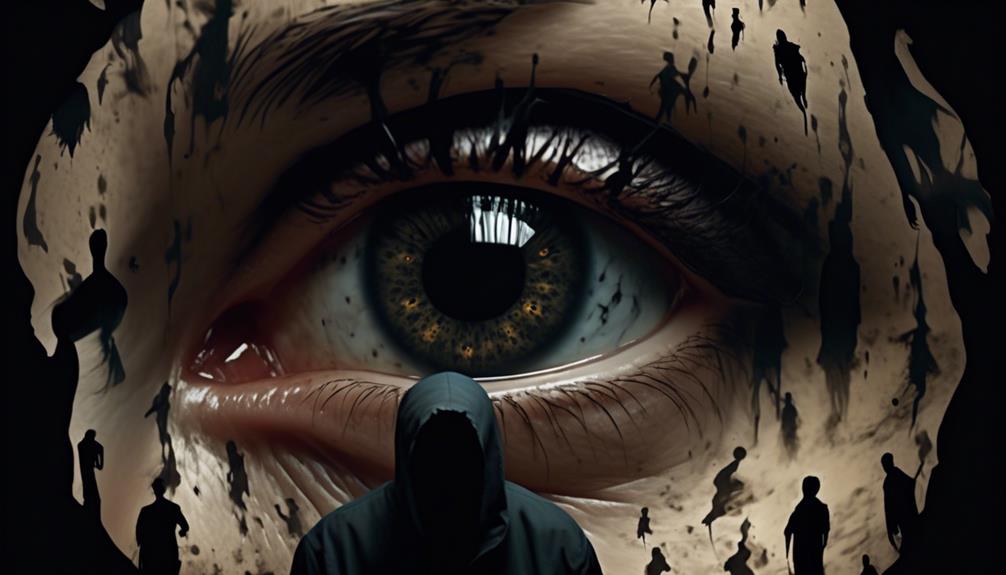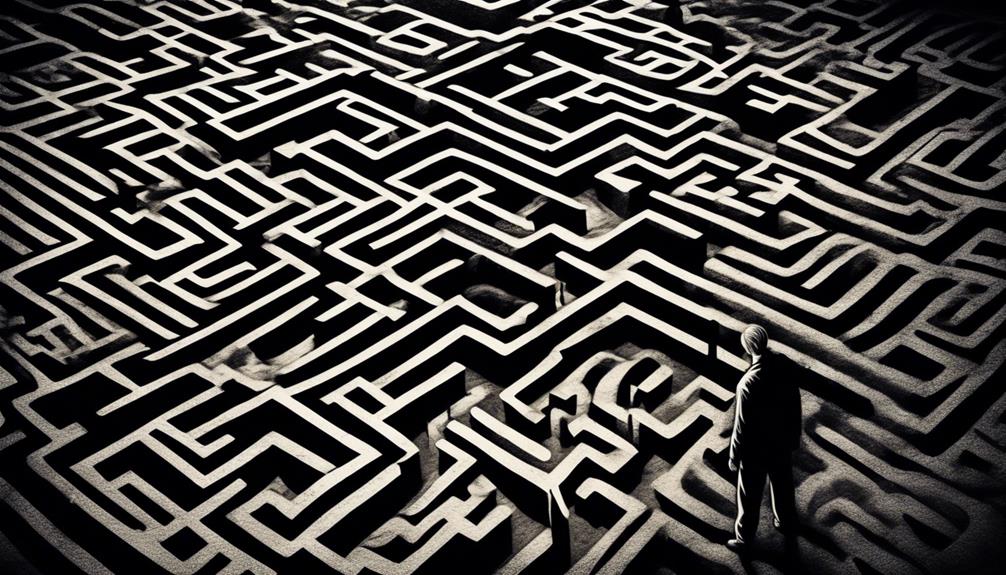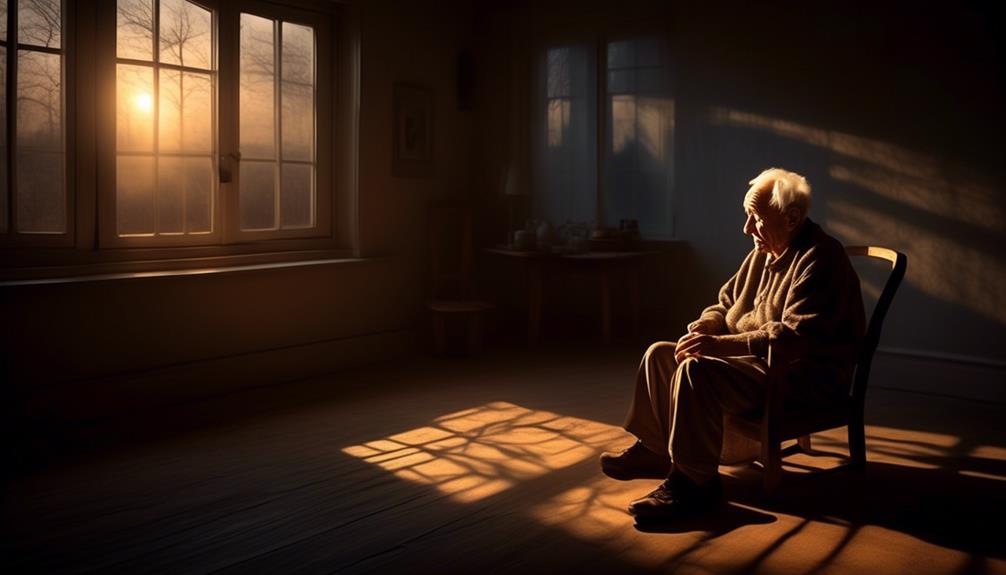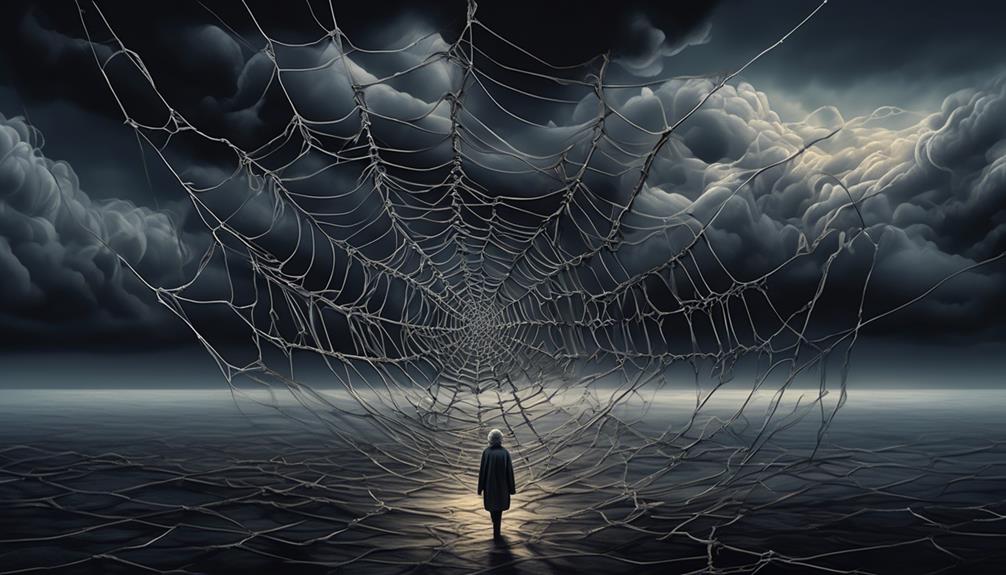Before, the idea that lack of sleep could cause hallucinations may have seemed far-fetched, but research has uncovered this intriguing connection.
As we explore the intricate relationship between sleep patterns and hallucinatory experiences, one cannot help but wonder about the profound impact sleep deprivation can have on our perception.
The link between sleep and hallucinations is a complex one, with various factors at play. Let’s unravel this intriguing phenomenon and uncover the mysteries behind the blurred lines of reality and dreams.
Key Takeaways
- Lack of sleep is strongly correlated with hallucinations.
- Sleep deprivation can lead to perceptual distortions and auditory misinterpretations.
- Chronic insomnia significantly increases the risk of experiencing hallucinations.
- Sufficient sleep and proper treatment for insomnia are essential in preventing hallucinations.
The Relationship Between Sleep and Hallucinations
The correlation between inadequate sleep and hallucinations is well-documented in scientific literature, emphasizing the critical impact of sleep quality on perceptual experiences. Sleep deprivation, whether due to total sleep deprivation or chronic insomnia, can lead to a range of symptoms, including perceptual distortions and hallucinations.
These hallucinations, particularly in the visual modality, can result from the gradual progression toward psychosis that can be exacerbated by a lack of proper rest. Symptoms of insomnia, such as difficulty falling or staying asleep, play a significant role in increasing the likelihood of experiencing hallucinations.
Furthermore, sleep deprivation not only contributes to the development of hallucinations but can also worsen existing mental health problems, such as depression, anxiety disorders, and bipolar disorder. Therefore, addressing sleep disturbances and ensuring adequate rest are crucial steps in preventing hallucinations and protecting overall mental well-being.
Proper treatment for insomnia, which may involve cognitive-behavioral therapy (CBT) and medication, is essential in mitigating the risk of hallucinations and other psychotic symptoms associated with inadequate sleep.
Effects of Sleep Deprivation on Perception
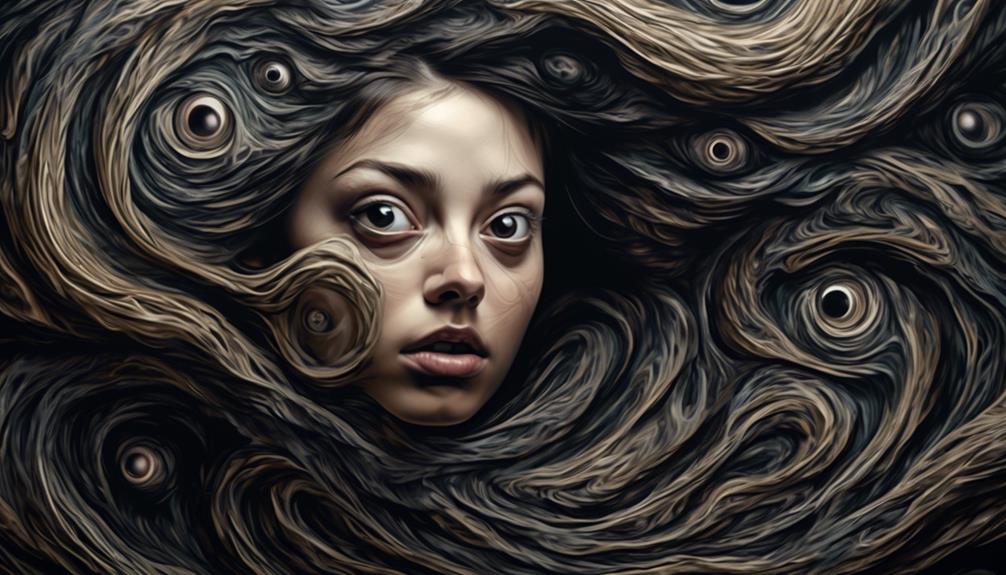
Inadequate sleep profoundly influences perceptual processes, leading to distortions and hallucinations that can significantly impact mental well-being. Sleep deprivation not only affects our cognitive functions but also alters how we perceive the world around us. Prolonged sleep loss can induce perceptual changes, particularly in sensory modalities such as vision, hearing, and touch. These alterations may manifest as visual distortions or auditory misinterpretations, contributing to the development of psychotic symptoms. Individuals experiencing psychopathological symptoms due to sleep deprivation may struggle with distinguishing reality from hallucinations, further exacerbating their mental health challenges.
| Sensory Modalities | Perceptual Changes | Impact on Mental Health |
|---|---|---|
| Vision | Visual distortions | Increased risk of psychosis |
| Hearing | Auditory misinterpretations | Impaired reality testing |
| Touch | Heightened sensations | Confusion and disorientation |
Prevention strategies such as maintaining a consistent sleep schedule, practicing good sleep hygiene, and seeking treatment for underlying sleep disorders are crucial in mitigating the detrimental effects of sleep deprivation on perception and overall mental well-being.
Hallucinations and Lack of Sleep
Research indicates a strong correlation between lack of sleep and the onset of perceptual distortions and hallucinations, particularly within the visual modality. When experiencing sleep deprivation, individuals may start with mild perceptual anomalies that can rapidly progress to visual hallucinations and even delusions.
The time of symptom onset is crucial, as symptoms of sleep deprivation tend to worsen the longer one stays awake. Psychotic symptoms can develop due to sleep problems, with chronic insomnia significantly increasing the likelihood of experiencing hallucinations.
It’s essential to recognize the link between sleep deprivation and psychological symptoms to address any potential risks promptly. Proper treatment for insomnia is vital in preventing the development of hallucinations and protecting overall mental health.
Understanding Sleep-Related Hallucinations
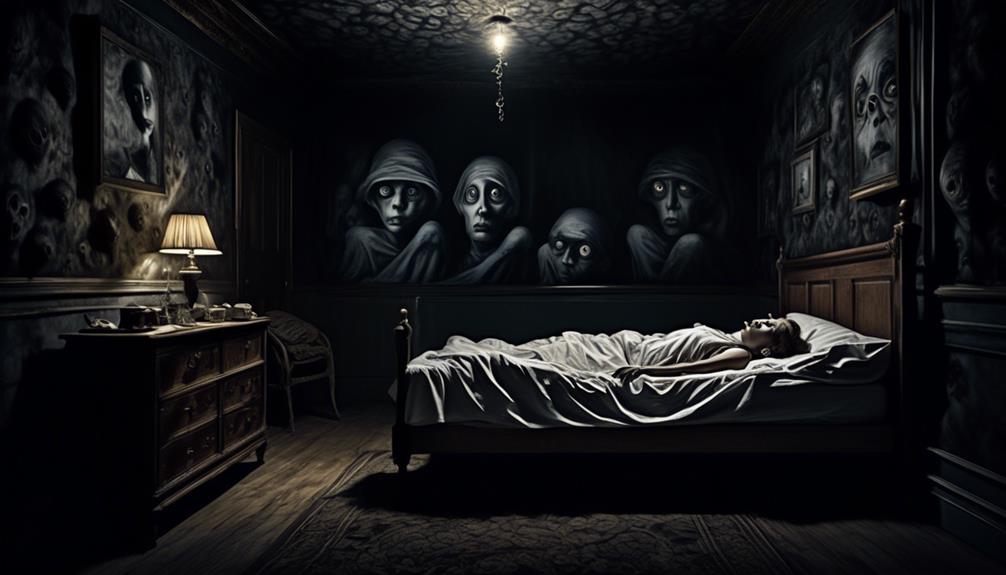
Exploring the intricate relationship between sleep deprivation and hallucinations reveals a complex interplay of physiological and psychological factors. Sleep-related hallucinations can be distressing experiences resulting from a lack of sufficient rest, affecting various sensory modalities and cognitive functions.
Here are some key points to consider:
- Perceptual Changes: Lack of sleep can distort our perception of reality, leading to vivid and sometimes frightening hallucinations.
- Psychotic Symptoms: Severe sleep deprivation may induce symptoms resembling acute psychosis, including disordered thinking and complex hallucinations.
- Visual Distortions: Sleep-related hallucinations often involve visual disturbances, such as seeing objects or people that aren’t there.
- Emotional Impact: These experiences can evoke strong emotions, causing confusion, fear, and distress.
- Need for Treatment: Understanding the underlying causes of sleep-related hallucinations is crucial for managing and preventing these episodes effectively.
Preventing Hallucinations Through Better Sleep
To enhance cognitive function and mental well-being, obtaining sufficient sleep is paramount in preventing hallucinations associated with sleep deprivation. Preventing hallucinations through better sleep involves various strategies such as maintaining a consistent sleep schedule, practicing good sleep hygiene, and addressing underlying causes of insomnia. Here are some evidence-based tips to help prevent hallucinations by improving sleep quality:
| Prevention Tips | Description |
|---|---|
| Prioritize Sleep | Get 7-9 hours of sleep each night to prevent sleep deprivation and reduce the risk of hallucinations. |
| Manage Stress | Address stress through relaxation techniques to improve sleep quality and prevent hallucinations. |
| Create a Sleep Routine | Establish a regular sleep schedule to regulate your body’s internal clock and promote better sleep. |
| Improve Sleep Environment | Create a comfortable and dark sleep environment to enhance sleep quality and prevent disturbances. |
| Seek Treatment | If experiencing chronic insomnia, seek treatment options like cognitive-behavioral therapy for better sleep. |
Frequently Asked Questions
How Long Does It Take to Hallucinate From Lack of Sleep?
We can hallucinate from lack of sleep in varying timeframes. Factors like individual susceptibility, duration of sleep deprivation, and pre-existing conditions influence how quickly hallucinations may occur.
The progression typically involves perceptual disturbances escalating to full-blown hallucinations. Understanding these factors can help predict and manage the risk of experiencing hallucinations due to sleep deprivation.
It’s crucial to prioritize adequate rest to safeguard our mental well-being.
Why Does Sleep Deprivation Cause Hallucinations?
We believe sleep deprivation causes hallucinations due to disruptions in brain functioning. Lack of sleep leads to overactivity and chaos in the brain, making us more prone to experiencing visual, auditory, or tactile hallucinations.
The exact brain mechanisms aren’t fully understood, but disruptions in visual brain functioning and excessive dopaminergic transmission are potential factors. Sleep deprivation can also disrupt blood sugar regulation, increasing the risk of metabolic conditions.
Can Lack of Sleep Cause Schizophrenia?
Yes, lack of sleep can exacerbate symptoms similar to schizophrenia, including delusions, hallucinations, and paranoia.
The impact of sleep deprivation on mental health is profound, with symptoms progressing with increasing time awake.
Proper treatment for insomnia is vital to prevent these manifestations and safeguard mental well-being.
It’s crucial to prioritize adequate sleep to maintain cognitive function and emotional stability.
How Long Can You Go Without Sleep Before Psychosis?
We can go without sleep for about five days before experiencing psychosis. During this time, our mental state gradually deteriorates, leading to symptoms like hallucinations and delusions.
It’s crucial to prioritize quality sleep to prevent reaching this critical point. Remember, burning the candle at both ends might seem doable, but the consequences can be severe.
Prioritize rest for a healthy mind and body.
Conclusion
In conclusion, it’s evident that lack of sleep can lead to hallucinations, with studies showing a clear link between sleep deprivation and perceptual disturbances.
Just as a ship without its anchor drifts aimlessly in the sea, our minds without proper rest can wander into hallucinatory realms.
Therefore, prioritizing good sleep hygiene and seeking treatment for insomnia is crucial in maintaining mental well-being and preventing the onset of hallucinations.
